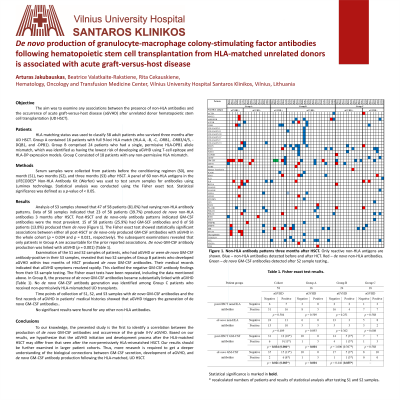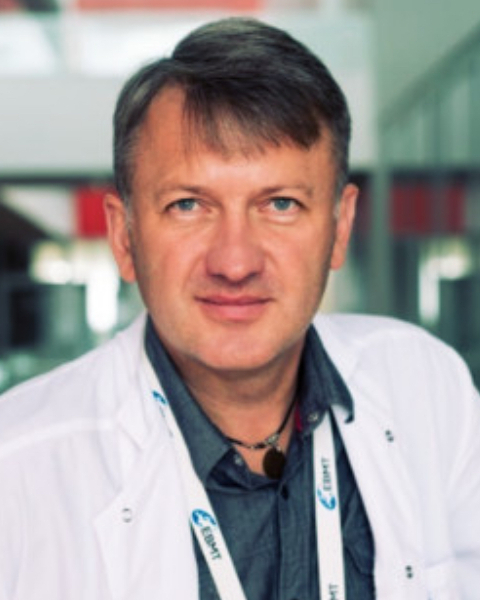(P225) De novo production of granulocyte-macrophage colony-stimulating factor antibodies following hematopoietic stem cell transplantation from HLA-matched unrelated donors is associated with acute graft-versus-host disease
Location: Platinum Ballroom

Poster Presenter(s)
Aim: An analysis of hematopoietic stem cell transplantation (HSCT) outcomes using grafts from HLA-matched unrelated donors (UD), HLA-matched siblings, and identical twins showed that, while the incidence rate was decreasing, acute graft-versus-host disease (aGvHD) was present in all settings. These findings lead to the conclusion that there may be non-HLA factors linked with the aGvHD. Our study aimed to investigate the potential links between non-HLA antibodies and aGvHD.
Method: A total of 58 patients were examined. Patients were also analyzed in three groups according to their matching status with UD: I group: 16 patients with 11 loci of HLA-match; II group: 24 patients with a single HLA-DPB1 allele mismatch, identified as having the lowest risk of developing aGvHD utilizing T-cell epitope and HLA-DP expression models; III group: 18 patients with ≥ 1 non-permissive mismatch at any HLA loci. Serum samples were tested using the LIFECODES Non-HLA Antibody Assay (Werfen). The Fisher exact test was used for statistical analysis.
Results: Pre-HSCT and 3-month post-HSCT serum samples from 23 individuals revealed distinct patterns of de novo non-HLA antibodies (Table 1). De novo-generated non-HLA antibodies did not correlate with the development of aGvHD in general or across all groups. The granulocyte-macrophage colony-stimulating factor (CSF2) antibody was found to be the most prevalent (8 out of 23 cases). The presence of de novo CSF2 antibodies was shown to be substantially linked with aGvHD in the total cohort (p = 0.021). The only I group patients significantly contributed to this outcome, indicating a strong link between de novo CSF2 antibodies and the development of grade II-IV aGvHD (p = 0.001). The other de novo non-HLA antibodies had no statistically meaningful findings.
Conclusion: Our findings show that the production of de novo CSF2 antibodies is strongly related to the development of grade II-IV aGvHD following HSCT when the graft was derived from an 11-loci HLA-matched UD. Based on these data, we hypothesize that the aGvHD development pathway in HLA-matched HSCT might be distinct from that in HLA-mismatched.
Method: A total of 58 patients were examined. Patients were also analyzed in three groups according to their matching status with UD: I group: 16 patients with 11 loci of HLA-match; II group: 24 patients with a single HLA-DPB1 allele mismatch, identified as having the lowest risk of developing aGvHD utilizing T-cell epitope and HLA-DP expression models; III group: 18 patients with ≥ 1 non-permissive mismatch at any HLA loci. Serum samples were tested using the LIFECODES Non-HLA Antibody Assay (Werfen). The Fisher exact test was used for statistical analysis.
Results: Pre-HSCT and 3-month post-HSCT serum samples from 23 individuals revealed distinct patterns of de novo non-HLA antibodies (Table 1). De novo-generated non-HLA antibodies did not correlate with the development of aGvHD in general or across all groups. The granulocyte-macrophage colony-stimulating factor (CSF2) antibody was found to be the most prevalent (8 out of 23 cases). The presence of de novo CSF2 antibodies was shown to be substantially linked with aGvHD in the total cohort (p = 0.021). The only I group patients significantly contributed to this outcome, indicating a strong link between de novo CSF2 antibodies and the development of grade II-IV aGvHD (p = 0.001). The other de novo non-HLA antibodies had no statistically meaningful findings.
Conclusion: Our findings show that the production of de novo CSF2 antibodies is strongly related to the development of grade II-IV aGvHD following HSCT when the graft was derived from an 11-loci HLA-matched UD. Based on these data, we hypothesize that the aGvHD development pathway in HLA-matched HSCT might be distinct from that in HLA-mismatched.

